| Listing 1 - 10 of 13 | << page >> |
Sort by
|
Book
ISBN: 8024625946 9788024625942 9788024625591 8024625598 Year: 2015 Publisher: Prague [Czech Republic]
Abstract | Keywords | Export | Availability | Bookmark
 Loading...
Loading...Choose an application
- Reference Manager
- EndNote
- RefWorks (Direct export to RefWorks)
Kniha navazuje na soucasný badatelský zájem o kulturu oblasti východního Stredomorí v poantickém a byzantském období. Zároven vyplnuje mezeru v bádání o pozdne antickém divadle. Dosud vetšinou opomíjený text reckého rétora Chorikia z Gazy (6. stol. po Kr.), známý pod latinským názvem Apologia mimorum, dlouho unikal pozornosti odborné verejnosti. Chorikiovu apologii autorka preložila, okomentovala a zasadila do historických souvislostí prelomové doby konce východorímské ríše, v níž si divadlo - pod tímto slovem je treba videt predevším mimos, nejstarší a nejvytrvalejší antický divadelní žánr - s.
Mythology, Greek. --- Greek mythology --- Dionysus --- Bacchus --- Bakchos --- Dionís --- Dionisas --- Dioniso --- Dionīss --- Dionisu --- Dioniz --- Dionizi --- Dionizo --- Dionizos --- Dionüszosz --- Dionysos --- Dionýzos --- Diyonizosse --- Διόνυσος --- Дионис --- ديونيسوس --- 디오니소스 --- דיוניסוס --- ディオニューソス --- 狄俄倪索斯 --- Βάκχος --- Діоніс --- (Greek deity)
Book
ISBN: 9781107038219 9781139814669 1139814664 9781107496958 1107496950 9781461953807 1461953804 9781107516830 1107516838 1107038219 1139892789 9781139892780 1107502527 9781107502529 1107506417 9781107506411 1107503701 9781107503700 1107514061 9781107514065 1108730078 1306211948 Year: 2013 Publisher: Cambridge : Cambridge University Press,
Abstract | Keywords | Export | Availability | Bookmark
 Loading...
Loading...Choose an application
- Reference Manager
- EndNote
- RefWorks (Direct export to RefWorks)
This book examines the fragmentary and contradictory evidence for Orpheus as the author of rites and poems to redefine Orphism as a label applied polemically to extra-ordinary religious phenomena. Replacing older models of an Orphic religion, this richer and more complex model provides insight into the boundaries of normal and abnormal Greek religion. The study traces the construction of the category of 'Orphic' from its first appearances in the Classical period, through the centuries of philosophical and religious polemics, especially in the formation of early Christianity and again in the debates over the origins of Christianity in the nineteenth and twentieth centuries. A paradigm shift in the study of Greek religion, this study provides scholars of classics, early Christianity, ancient religion and philosophy with a new model for understanding the nature of ancient Orphism, including ideas of afterlife, cosmogony, sacred scriptures, rituals of purification and initiation, and exotic mythology.
Dionysies --- Dionysia. --- Dionysus (Greek deity) --- Cults --- Cult. --- Dionysos, --- Dionysus --- Dionysus, --- Dionysies. --- Orphic mysteries --- Orphism --- Bacchus --- Bakchos --- Dionís --- Dionisas --- Dioniso --- Dionīss --- Dionisu --- Dioniz --- Dionizi --- Dionizo --- Dionizos --- Dionüszosz --- Dionysos --- Dionýzos --- Diyonizosse --- Διόνυσος --- Дионис --- ديونيسوس --- 디오니소스 --- דיוניסוס --- ディオニューソス --- 狄俄倪索斯 --- Βάκχος --- Діоніс --- Arts and Humanities --- History
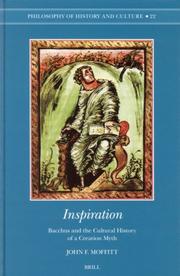
ISBN: 9004142797 9789004142794 9781429452762 1429452765 9781433706851 1433706857 1280867663 9781280867668 9786610867660 6610867666 9047407024 9789047407027 Year: 2005 Publisher: Leiden Boston Brill
Abstract | Keywords | Export | Availability | Bookmark
 Loading...
Loading...Choose an application
- Reference Manager
- EndNote
- RefWorks (Direct export to RefWorks)
The purpose of this book is to reveal the antique pedigree of a now commonplace term, "Inspiration," an essential creation-myth now propelling notions of "self-expression" in modern art-making. Knowledge of the ancient sources of such supposedly "modernist" fixations will make a significant contribution to historical-cultural thinking, particularly by showing in detail the facts of an unrecognized evolutionary continuity. In order to personify "Inspiration," this study initially focuses upon Michelangelo's Bacchus of 1496, so revealing now-forgotten meanings once typically to be attached in a generic way to any "Bacchus." Then it demonstrates how these "Dionysiac" concepts arose in ancient Greece. Later developments--particularly from the Middle Ages through the Renaissance--are traced here for the first time. Due to further modifications by Friedrich Nietzsche, Dionysiac "expressionism" eventually became a staple of modern art theory and practice.
Inspiration --- Creation (Literary, artistic, etc.) --- Creative ability in art --- Creative ability in literature --- Art --- Imagination --- Literature --- Creative ability --- Originality --- History. --- Dionysus --- Bacchus --- Bakchos --- Dionís --- Dionisas --- Dioniso --- Dionīss --- Dionisu --- Dioniz --- Dionizi --- Dionizo --- Dionizos --- Dionüszosz --- Dionysos --- Dionýzos --- Diyonizosse --- Διόνυσος --- Дионис --- ديونيسوس --- 디오니소스 --- דיוניסוס --- ディオニューソス --- 狄俄倪索斯 --- Βάκχος --- Діоніс --- Dionysus (Greek deity) --- Creation (Literary, artistic, etc. --- Inspiration.
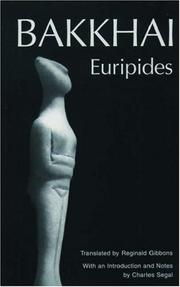
ISBN: 1280830964 0199725934 9780199725939 0195125983 9780195125986 0195125975 0199880816 0197704336 Year: 2001 Publisher: Oxford ; New York : Oxford University Press,
Abstract | Keywords | Export | Availability | Bookmark
 Loading...
Loading...Choose an application
- Reference Manager
- EndNote
- RefWorks (Direct export to RefWorks)
Euripides' Bakkhai is a staple of the canon of Greek tragedy, as its structure and thematics offer exemplary models of the classic tragic elements. The plot centres around the actions of Pentheus, King of Thebes, who refused to recognise Dionysus.
Pentheus (Greek mythology) --- Bacchantes --- Dionysus --- Bacchus --- Bakchos --- Dionís --- Dionisas --- Dioniso --- Dionīss --- Dionisu --- Dioniz --- Dionizi --- Dionizo --- Dionizos --- Dionüszosz --- Dionysos --- Dionýzos --- Diyonizosse --- Διόνυσος --- Дионис --- ديونيسوس --- 디오니소스 --- דיוניסוס --- ディオニューソス --- 狄俄倪索斯 --- Βάκχος --- Діоніс --- Dionysus (Greek deity) --- Pentheus, --- Penthée, --- Πενθεύς, --- Τενθεύς, --- Tentheus, --- Greek drama (Tragedy) --- Euripides.
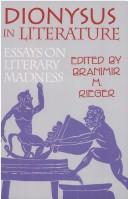
ISBN: 1280487828 9786613583055 0299278735 9780299278731 0879726490 0879726504 9780879726508 9780879726492 Year: 1994 Publisher: Bowling Green, OH Bowling Green State University Popular Press
Abstract | Keywords | Export | Availability | Bookmark
 Loading...
Loading...Choose an application
- Reference Manager
- EndNote
- RefWorks (Direct export to RefWorks)
Dionysus (Greek deity) in literature. --- Mental illness in literature. --- Insanity in literature --- Psychopathology in literature --- Dionysus --- In literature. --- Bacchus --- Bakchos --- Dionís --- Dionisas --- Dioniso --- Dionīss --- Dionisu --- Dioniz --- Dionizi --- Dionizo --- Dionizos --- Dionüszosz --- Dionysos --- Dionýzos --- Diyonizosse --- Διόνυσος --- Дионис --- ديونيسوس --- 디오니소스 --- דיוניסוס --- ディオニューソス --- 狄俄倪索斯 --- Βάκχος --- Діоніс
Book
ISBN: 1905739737 9781905739738 Year: 2014 Publisher: Oxford
Abstract | Keywords | Export | Availability | Bookmark
 Loading...
Loading...Choose an application
- Reference Manager
- EndNote
- RefWorks (Direct export to RefWorks)
Dionysos carried the blessing of wine to the whole world, and his triumphant return from India became a popular subject for the arts of Greece and Rome in many media. The iconography survived the ancient world into Renaissance and neo-Classical arts, and may even have contributed to the practices of modern circus parades.
Dionysus --- Bacchus --- Bakchos --- Dionís --- Dionisas --- Dioniso --- Dionīss --- Dionisu --- Dioniz --- Dionizi --- Dionizo --- Dionizos --- Dionüszosz --- Dionysos --- Dionýzos --- Diyonizosse --- Διόνυσος --- Дионис --- ديونيسوس --- 디오니소스 --- דיוניסוס --- ディオニューソス --- 狄俄倪索斯 --- Βάκχος --- Діоніс --- Art gréco-romain --- Art, Greco-Roman --- Thèmes, motifs. --- Themes, motives --- Dionysos (divinité grecque) --- Dans l'art
Book
ISBN: 9789004355330 9004355332 9789004355347 9004355340 Year: 2018 Publisher: Leiden Boston
Abstract | Keywords | Export | Availability | Bookmark
 Loading...
Loading...Choose an application
- Reference Manager
- EndNote
- RefWorks (Direct export to RefWorks)
This Study of the Narrator in Nonnus of Panopolis' Dionysiaca by Camille Geisz investigates manifestations of the narratorial voice in Nonnus' account of the life and deeds of Dionysus (4th/5th century C.E.). Through a variety of interventions in his own voice, the narrator reveals much about his relationship to his predecessors, his own conception of story-telling, and highlights his mindfulness of the presence of his narratee. Narratorial devices in the Dionysiaca are opportunities for displays of ingeniousness, discussions of sources, and a reflection on the role of the poet. They highlight the innovative style of Nonnus' epic, written as a compendium of influences, genres, and myths, and encompassing the influence of a thousand years of Greek literature.
Literature. --- Narration (Rhetoric) --- Narration (Rhetoric). --- History --- Dionysus, --- Nonnus, --- In literature. --- Dionysiaca (Nonnus, of Panopolis). --- To 1500. --- Bacchus --- Bakchos --- Dionís --- Dionisas --- Dioniso --- Dionīss --- Dionisu --- Dioniz --- Dionizi --- Dionizo --- Dionizos --- Dionüszosz --- Dionysos --- Dionýzos --- Diyonizosse --- Διόνυσος --- Дионис --- ديونيسوس --- 디오니소스 --- דיוניסוס --- ディオニューソス --- 狄俄倪索斯 --- Βάκχος --- Діоніс --- Dionysus --- E-books --- Rhetoric --- Discourse analysis, Narrative --- Narratees (Rhetoric) --- Narration --- Nonnos de Panopolis --- Critique et interprétation. --- Les Dionysiaques.
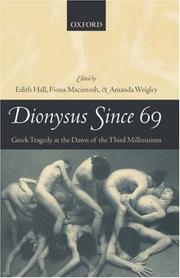
ISBN: 1280905212 019155541X 1423768035 9781423768036 9780199259144 0199259143 9781280905216 9786610905218 6610905215 0199281319 9780199281312 9780191555411 1383040117 Year: 2023 Publisher: Oxford : Oxford University Press,
Abstract | Keywords | Export | Availability | Bookmark
 Loading...
Loading...Choose an application
- Reference Manager
- EndNote
- RefWorks (Direct export to RefWorks)
The 14 essays in this text, from an interdisciplinary team, relate the recent appeal of Greek tragedy to social trends, political developments, aesthetic and performative developments, and the intellectual currents of the last three decades.
Greek drama --- Greek drama (Tragedy) --- Theater --- Languages & Literatures --- Greek & Latin Languages & Literatures --- Dramatics --- Histrionics --- Professional theater --- Stage --- Theatre --- Performing arts --- Acting --- Actors --- Greek literature --- Presentation, Modern --- History and criticism --- Appreciation --- Adaptations --- History --- Production and direction --- Dionysus --- In literature. --- Bacchus --- Bakchos --- Dionís --- Dionisas --- Dioniso --- Dionīss --- Dionisu --- Dioniz --- Dionizi --- Dionizo --- Dionizos --- Dionüszosz --- Dionysos --- Dionýzos --- Diyonizosse --- Διόνυσος --- Дионис --- ديونيسوس --- 디오니소스 --- דיוניסוס --- ディオニューソス --- 狄俄倪索斯 --- Βάκχος --- Діоніс --- Dionysus (Greek diety) --- Presentation, Modern. --- History and criticism. --- Production and direction.
Book

ISBN: 9783110222340 9783110222357 3110222345 3110222353 1306968313 Year: 2011 Publisher: Berlin Boston
Abstract | Keywords | Export | Availability | Bookmark
 Loading...
Loading...Choose an application
- Reference Manager
- EndNote
- RefWorks (Direct export to RefWorks)
Dionysos erscheint innerhalb der modernen Wissens- und Darstellungsformationen oft als untypisch für die antike Kultur, als Ausnahme im Kontext des antiken Polytheismus, ja als Instanz einer Differenz, die die Moderne antizipiert. Was können neuere Forschungen zum genaueren Verständnis der vielfältigen Transformationen des antiken Gottes beitragen? Dieser Frage widmen sich Vertreter aller Bereiche der Altertumswissenschaften in diesem Band, der aus einer internationalen Tagung im März 2009 im Berliner Pergamonmuseum hervorgeht. Eine vergleichbare Publikation liegt bisher weder in deutscher oder englischer noch in anderen Sprachen vor. Zu den in dem Band behandelten Themen gehören aktuelle Forschungsfragen - einschließlich wissenschaftsgeschichtlicher Aspekte - zur Stellung des Dionysos im Rahmen der antiken griechischen und römischen Religion von den Anfängen bis zur Spätantike (Riten und Festkultur, Mythen, Epiphaniekonzepte, Theaterpraxis, Architektur und Ökonomie der Heiligtümer), anhand von - zum Teil neuentdeckten - epigraphischen, literarischen, bildkünstlerischen, historiographischen und philosophischen Quellen.
Dionysus (Greek deity) --- Dionysus (Greek deity) in literature --- Cult --- Art --- Dionysoskult. --- Mythologie. --- Polytheismus. --- Rezeption. --- Kult. --- Dionysus (Greek deity). --- Literature. --- Polytheism --- Art. --- Cult. --- Dionysus, --- Dionysos. --- Dionysos, --- In literature --- Geschichte. --- Polytheism. --- Dionysus (Greek deity) -- Art -- Congresses. --- Dionysus (Greek deity) -- Congresses. --- Dionysus (Greek deity) -- Cult -- Congresses. --- Dionysus (Greek deity) in literature -- Congresses. --- Religion --- Philosophy & Religion --- European Religions - pre-Christian --- Dionysus --- Bacchus --- Bakchos --- Dionís --- Dionisas --- Dioniso --- Dionīss --- Dionisu --- Dioniz --- Dionizi --- Dionizo --- Dionizos --- Dionüszosz --- Dionysos --- Dionýzos --- Diyonizosse --- Διόνυσος --- Дионис --- ديونيسوس --- 디오니소스 --- דיוניסוס --- ディオニューソス --- 狄俄倪索斯 --- Βάκχος --- Діоніс --- Antike. --- Antiquity. --- Religion. --- HISTORY / Ancient / Greece. --- Dionysus (Greek deity) - Art - Congresses --- Dionysus (Greek deity) - Congresses. --- Dionysus (Greek deity) - Cult - Congresses --- Dionysus (Greek deity) in literature - Congresses
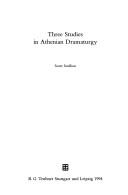
ISBN: 3519074745 3598774745 3110950537 9783110950533 9783519074748 Year: 1994 Volume: Bd. 25 Publisher: Stuttgart G.B. Teubner
Abstract | Keywords | Export | Availability | Bookmark
 Loading...
Loading...Choose an application
- Reference Manager
- EndNote
- RefWorks (Direct export to RefWorks)
Keine ausführliche Beschreibung für "Three Studies in Athenian Dramaturgy" verfügbar.
Dionysus (Greek deity) --- -Greek drama (Tragedy) --- -Ajax (Greek mythology) in literature --- Theater --- -Drama --- Drama, Modern --- Plays --- Stage --- Literature --- Acting --- Dialogue --- Dramatics --- Histrionics --- Professional theater --- Theatre --- Performing arts --- Actors --- Cult --- History and criticism --- History --- -Technique --- Philosophy --- Aeschylus --- Sophocles --- Eskhil --- Eschylus --- Aischylos --- Esquilo --- Eschilo --- Aiskhilos --- Eshil --- Æskílos --- Ajschylos --- Eschil --- Eschyle --- Äschylos --- Eskili --- Aiszkhülosz --- Eschylos --- Iskilos --- Эсхил --- אייסכילוס --- איסכילאס --- איסכילוס --- إيسخولوس --- ايسخيلوس --- Αἰσχύλος --- Technique. --- Homes and haunts --- -Homes and haunts --- -Dionysus (Greek deity) --- -Cult --- Sofokles --- Sophocle --- Sofocle --- Sophokles --- Sofocles --- -Theater --- Greek drama (Tragedy) --- Ajax (Greek mythology) in literature. --- Drama --- History and criticism. --- Cult. --- Sophocles. --- Athens (Greece) --- Intellectual life. --- Dramaturgy --- -Dramatics --- Authorship --- Playwriting --- Technique --- Ajax (Greek mythology) in literature --- Dionysus --- Bacchus --- Bakchos --- Dionís --- Dionisas --- Dioniso --- Dionīss --- Dionisu --- Dioniz --- Dionizi --- Dionizo --- Dionizos --- Dionüszosz --- Dionysos --- Dionýzos --- Diyonizosse --- Διόνυσος --- Дионис --- ديونيسوس --- 디오니소스 --- דיוניסוס --- ディオニューソス --- 狄俄倪索斯 --- Βάκχος --- Діоніс --- Esḳilos --- Sófocles --- Sofoklis --- Sofokl --- Sūfūklīs --- Sūtmūklīs --- Sofokŭl --- סופוקלס --- سوفوكليس --- Σοφοκλῆς --- Sophoclis
| Listing 1 - 10 of 13 | << page >> |
Sort by
|

 Search
Search Feedback
Feedback About UniCat
About UniCat  Help
Help News
News